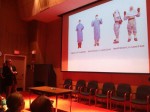Precautions, Not Panic, Needed to Prevent the Spread of Ebola

Preparation and control by health care professionals are the keys to preventing the spread of Ebola, one of the region’s leading infectious disease experts said on Friday.
During an hour-long presentation to doctors and staff at Phelps Memorial Hospital, Dr. Harish Moorjani, the director of the Infections Disease Clinic at Westchester Medical Center and a consultant for Phelps, explained that the disease can only be spread through contact with blood or bodily fluids of an infected person. It is easy to control if hospitals take the proper precautions, he said.
After the virus killed Thomas Eric Duncan in Dallas last week, Moorjani criticized the hospital for not following the correct procedures and for allowing a nurse, who is now infected, to leave the area and take a commercial flight. He said the hospital was unprepared and the incident should be investigated for malpractice.
“Shame on the administration in that Dallas hospital…where two of their nurses got the virus transmitted from a patient because, I think, they were negligent,” he said.
Moorjani said he is confident that a breech in protocol wouldn’t happen at Phelps or other local hospitals. Proper precautions should always be taken when dealing with a patient who may have had contact with the virus. Medical professionals need to be properly covered when dealing with a potential Ebola patient and utilize the buddy system to ensure that protective gear is worn and removed correctly. In addition, blood samples that need to be sent to a lab for analysis must be handled with great care.
Dr. Emil Nigro, director of emergency services at Phelps, said that when a patient who believed he was experiencing symptoms of Ebola was brought to the hospital earlier this month, the man was immediately isolated to reduce the chance of contact with other patients. In addition, doctors took a detailed history from the man to determine where he may have traveled and who he may have come into contact with.
“We should all be secure that if we have a patient, we’re going to be able to evaluate them and contain that patient either in our decontamination center or another part of the hospital,” Nigro said.
Symptoms of Ebola usually begin with a fever, which guidelines state will typically be about 101.5 degrees. Moorjani explained that the fever of the nurse in Dallas reached only 99.7. Symptoms then progress to hemorrhages and bleeding, at which point most patients are unlikely to survive.
Moorjani urged patients who think they could have Ebola to stay home and call the hospital. That way he or she can be properly transported and treated and kept in isolation. Nigro said that Phelps is currently training EMS staff so they know what to do if that situation arises.
Although local hospitals are currently prioritizing the disease and establishing protocol, Moorjani said it is unlikely that anybody in Westchester will contract the virus. He noted that there have been roughly 9,000 cases of Ebola and 4,500 deaths from the disease aroudn the globe, while last year in the United States, there were two million cases of flu resulting in 30,000 deaths.
“There’s a vaccine available [for the flu]. Go get it and tell everybody to do it,” he said. “If that vaccine were available for Ebola, everybody would run out and get it and there’s only one case in the United States so far.”
Moorjani explained that the disease is more easily spread in Africa, where it originated, because of a lack of proper medical resources. In addition, different religious and cultural practices play a large part. For example, some families will transport a body back to the place of birth, without a body bag, for a burial. In addition, it is traditional to perform a funeral massage on the body to help the soul go to heaven. When family members touch these bodies that were infected with Ebola they can contract the disease from contact with the hemorrhages through even the smallest break in their skin, Moorjani said.
He noted that treatments for the disease, which has been seen in humans since 1976, have not previously been found because there was no financial gain for pharmaceutical companies to develop a drug. Currently, there are several drugs that are being utilized to treat the disease, and medical researchers in Canada and the United States are working on a vaccine.
Moorjani urged the public to avoid some of the more sensational media coverage about the virus. Instead, people need to continue to go about their daily routines and not live in fear.
“Just because there is one case in Dallas, and three cases in Spain, we should not stop living,” he said. “There will be a cure, there will be a vaccine, I’m certain. I don’t think this will be a big deal in this country.”

Examiner Media – Keeping you informed with professionally-reported local news, features, and sports coverage.
